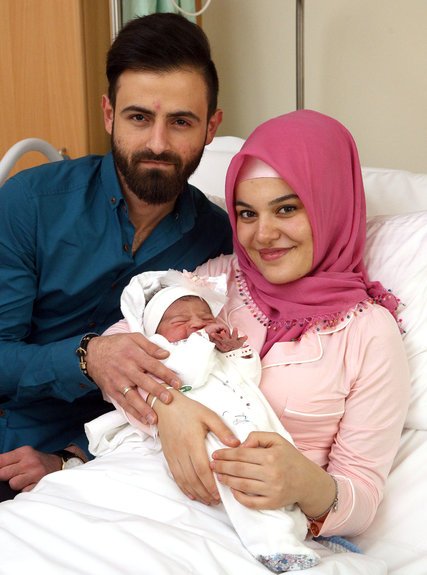
Naime and Alper Tamga with their daughter Asel, who was the first baby to be born in Vienna in 2018 -Votava photo.
Berlin, MINA — Within hours of her birth, 47 minutes into 2018, little Asel had attracted the attention of her home city, Vienna, as the Austrian capital’s “New Year’s Baby.”
But instead of good wishes from the citizens who read her birth announcement, splashed across Austrian newspapers on New Year’s Day, the little girl and her family were greeted with a wave of racism, disgust and hate, The New York Times reported.
Public announcements of “New Year’s Babies,” complete with images of beaming parents holding their offspring born shortly after New Year’s Eve, are an annual mainstay of newspapers throughout the German-speaking world.
But internet rights and refugee support groups say they had never seen a wave of hate directed at an infant to compare with the one that met Asel and her parents, identified by the newspaper Heute as Naime and Alper Tamga.
Also Read: Finland Signals Readiness to Recognize Palestine Amid International Momentum
“In the first hours of her life, this sweet girl was already the target of an unbelievable wave of violent, hateful online commentary,” Klaus Schwertner, secretary general of the Vienna chapter of the Roman Catholic charity Caritas, wrote on his Facebook page.
“It is a completely new dimension of online hate, targeting an innocent newborn,” he said.
Many of the comments that filled the social media pages of Austrian media outlets that carried the picture of Asel’s family, released by the Vienna Hospital Association, also targeted the baby’s mother, whose smiling face was encircled by a bright pink head scarf.
“I’m hoping for a crib death,” wrote one user. “Deport the scum immediately,” read another posting to Heute’s Facebook page, it reported on Thursday.
Also Read: Portugal to Recognize State of Palestine
Many of the messages have since been taken down, but the paper said they were being examined to see if they had broken laws against inciting hatred or against hate speech.
Posting hearts with words of congrats, support and encouragement.
Not all of the comments were negative, and some users drew a parallel between the online uproar over the image of the young Muslim and the entry of the far-right Freedom Party into the country’s new right-leaning government, sworn in weeks before her birth. Both the Freedom Party and the conservative People’s Party of Chancellor Sebastian Kurz campaigned on anti-immigrant platforms, and the new government has vowed to cut monetary benefits to refugees and curb illegal immigration.
Nevertheless, Mr. Schwertner sought to turn the sentiment around, calling on his followers to stand up for the young family in an outpouring of social media support. By Thursday, more than 10,000 people had shared his message and more than 17,000 people posted hearts, along with words of congratulations, support and encouragement.
Also Read: Malta to Recognize State of Palestine at UN General Assembly in September
“Welcome to the world little one. May your life be blessed with love and peace,” Liesbeth Halbertsma wrote on Facebook. “I know it doesn’t always look like that in the world … but there is so much beauty and love. Sending you much love.”
Barbara Unterlechner, the director of a center that provides legal counseling and support, #GegenHassimNetz, or “Against Online Hate,” said that since the arrival of hundreds of thousands of migrants seeking asylum two years ago, Austria had seen a rise in racist commentary and hate speech on the internet. More than 145,000 people, many from Syria, Iraq and Afghanistan, have applied for asylum in Austria since 2015, according to government figures.
“A certain stereotype about Muslims has become increasingly common on social media,” Ms. Unterlechner said in a telephone interview from Vienna. “Whether refugees or those wearing head scarves, there is no differentiation, but anyone appearing to be Muslim is cast as an enemy of our culture.”
It was not yet clear whether any of the comments would lead to legal complaints, Ms. Unterlechner said. But she was encouraged by how many people had responded to Mr. Schwertner’s call for support, given how challenging it could be for prosecutors to follow up on a wave of hate postings.
Also Read: Tsunami Alerts Lifted Across Pacific After Massive Quake Hits Russia’s East Coast
“Hate speech is ultimately a social problem, which can’t always be solved by the law,” Ms. Unterlechner said. “So it can be helpful to change the direction of the conversation online.” (T/RS5/RS1)
Mi’raj Islamic News Agency (MINA)
Also Read: UK to Recognize Palestine in September, Says PM Starmer






















 Mina Indonesia
Mina Indonesia Mina Arabic
Mina Arabic